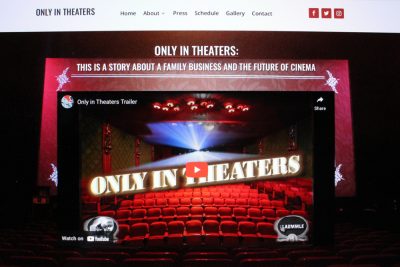There’s one family that has maintained a constant presence within Hollywood circles and the Los Angeles film community: the Laemmles.
“Only in Theaters” traces the history of the iconic Laemmle family, who have cultivated a culture of film appreciation and inclusion that has attracted the works of cinema’s most venerated auteurs.
Raphael Sbarge chronicles the story of the Laemmle family from the 20th century to the present. Sbarge focuses on more recent hardships, namely those concerning the financial troubles of Laemmle Theaters over the last three years.

The film begins by describing the origins of the Laemmle family in the United States. Carl Laemmlae, one of film’s earliest pioneers and champions, migrated to Chicago from Germany in 1884.
After living as a bookkeeper and office manager, he decided to enter the theaters business after visiting a nickelodeon, small theaters where viewers paid five cents to watch a film.
Carl subsequently went on to found Universal Studios, solidifying a legacy in film carried on by his children and cousins. In 1938, his cousins established the first Laemmle Theater in Highland Park, Los Angeles. Today, the company is owned and operated by Robert Laemmlae, Max Laemmle’s son, and Robert’s son, Greg Laemmle. It stands as one of the premiere arthouse theater groups in the country.
The audience is taken through the uniquely rich history of the Laemmle Theaters. Sbarge emphasizes that the family are cultural giants and genuine lovers of the art of filmmaking.
Interviews from critics, scholars, employees and filmmakers are interspersed throughout the film. Each individual speaks to the significance of Laemmle Theaters in a wider scope.
As stated by Oscar-nominated director Ava Duvernay, “If you’re from a place where there’s no movie theater, the opportunity to see these films in a space like Laemmle becomes pretty monumental.”
The content of these segments becomes a bit redundant as the film unfolds—and reverberates a passion and appreciation for the sanctuary the Laemmle family has created in cinema.
The anecdotes on the importance of arthouse theaters and the movie theater experience are true, but there were a few moments where their main objective became a bit muddled. I found that the film is most powerful when it’s focused on the Laemmle family themselves.
The narration aids in providing context in moments, but only in some areas. A narrative that concerns the impact of the digital age on Laemmle theaters doesn’t dive into relevant examples that follow the primary story it investigates.
The emergence of digital media has certainly had an effect on theater operations and the film industry on a global scale, but the audience is left to assume the specifics of said consequences in relation to Laemmle Theaters.
Despite this, “Only in Theaters” still packs a strong punch, especially during the film’s second half. It’s in this section — which addresses the impact of the COVID-19 pandemic on the business and on Greg Laemmle — that the heart of the story beats most ferociously.
The history of this family and the reputation they’ve cultivated throughout four generations is taut with successes and failures. In focusing on the weight of such a legend — and the unexpected obstacles he’s been forced to confront regarding the pandemic — Sbarge includes the audience in intimate moments that effortlessly demand compassion and focus.
Amidst the intense vignettes and demands of Laemmle Theaters’ operational efforts, the story maintains a straight line of focus. One easily finds themselves a member of the ever-growing community of film lovers powerfully impacted by Laemmle theaters.
I found myself rooting for its survival against all odds.
In these final moments, Sbarge crafts an empathetic and relatable portrait of Greg Laemmle and his family. The audience comes to know him beyond his family name, allowing a deeper appreciation of the life and legacy of Laemmle Theaters.
“Only in Theaters” is a deeply heartfelt film. Despite the difficult nature of their journey, there is still hope to be found for Laemmle Theaters and the preservation of arthouse theaters and the communities surrounding them.





















































































































